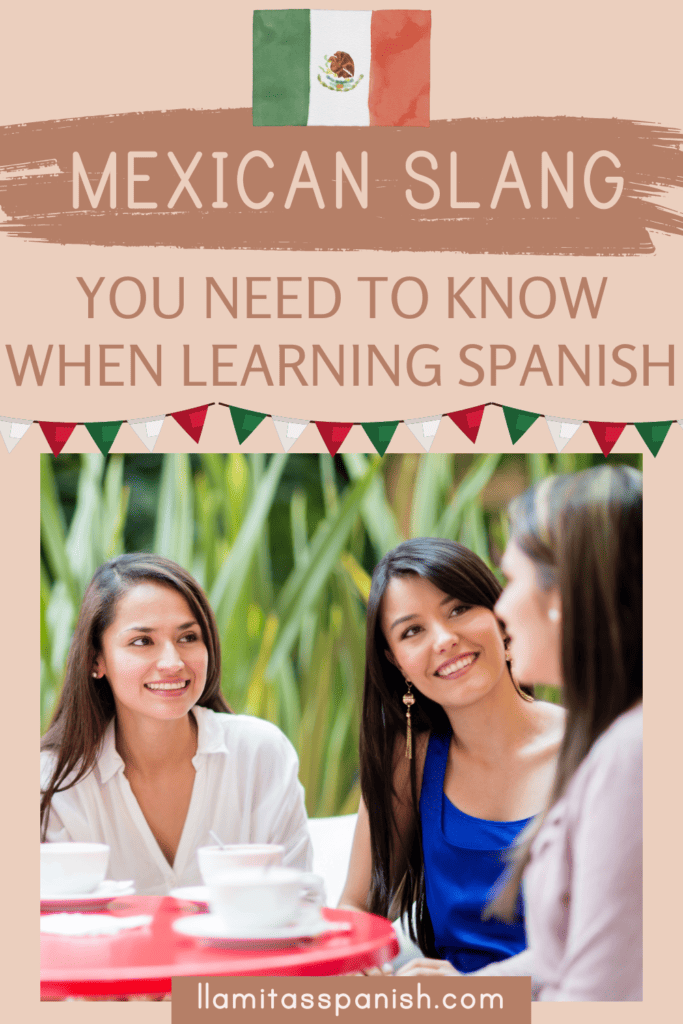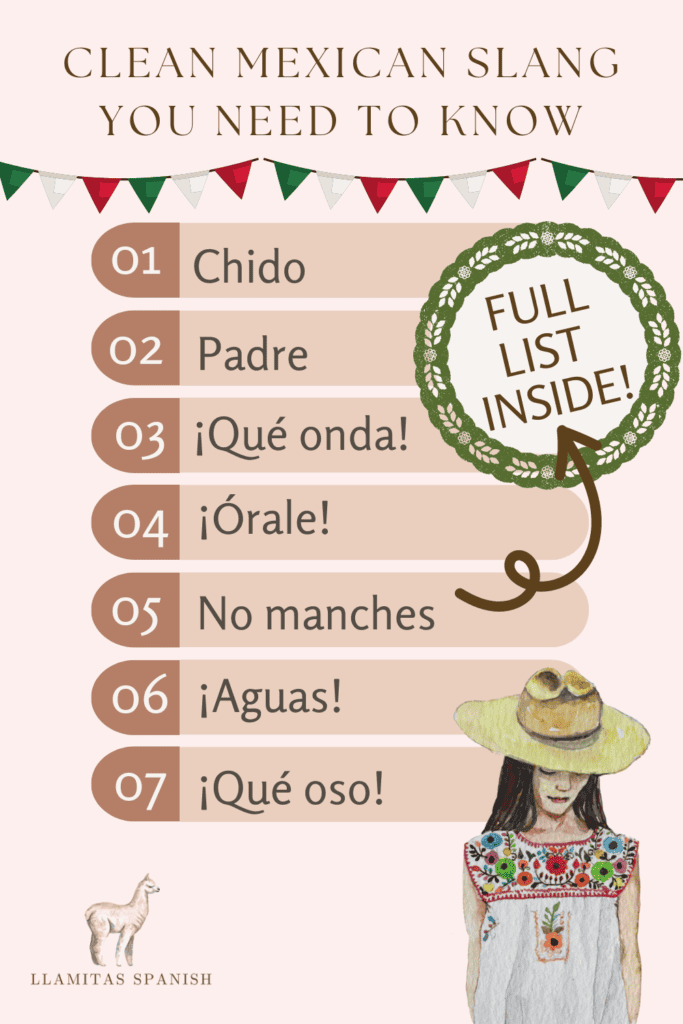In this post: A round-up of useful words and phrases that are used in Mexican slang. Don’t worry- they are all clean!

Post contains affiliate links.
When it comes to learning a language and traveling, the slang of a country or region is not only useful to know, it’s essential for fully understanding and communicating with the locals.
Every Spanish speaking country has its own vocabulary and slang words, and Mexico is no exception. In fact, Mexico has some of my favorite Spanish slang words and phrases that I even hear here in my neighborhood in San Diego.
If you live near Mexico or plan to travel there soon, we’re here to help you brush up on your Mexican slang!
Related Post: Top-rated Spanish Courses for Adults
Mexican Spanish
Spanish entered Mexico in the 16th century when General Hernán Cortes arrived in what is now Mexico City. For the full history recap check out this post from our friends at Lingopie.
But even today, Mexican Spanish still retains many of its indigenous and ancestral languages that existed before the conquest. The country is actually home to 364 language variants and these languages continue to influence Mexican Spanish.
For example, the ‘ch’ sound, a sound originating from the Aztecs, is used far more frequently in Mexican Spanish for words like ‘chancho’, ‘chido’, ‘chafa’, ‘chorro’ and so many more. We’ll discover their meanings below.
So let’s dive into 20+ common Mexican slang words that you need to know!

Mexican Slang Words & Phrases
Chido
Meaning: ‘cool’ or ‘awesome’.
Example: Gané dos boletos para el concierto. ¡Qué chido!
Padre
Meaning: ‘cool’ or ‘awesome’.
Example: ¡Está muy padre tu casa!
Güey
Meaning: ‘dude’, ‘friend’, ‘mate’.
Example: Oye güey, ¿ya terminaste tu comida?
Lonche
Meaning: Lunch. (More common in the USA and border towns).
Example: Es la hora del lonche.
¡Qué onda!
Meaning: A way of greeting someone to say hello.
Example: ¡Qué onda! ¿Cómo estás?
¡Órale!
Meaning: A word to show amazement.
Example: ¡Órale! Ya acabaste toda tu tarea.
Neta
Meaning: ‘the truth’. It can be used in many ways such as to praise someone or to ask if someone is being serious.
Examples: ¡Eres la neta! / ¿Neta?
No manches
Meaning: A typical phrase used when someone tells you about something great, or if you don’t know if they are being serious.
Example: ¡Me gané la lotería! – ¡No manches!
¡Aguas!
Meaning: An expression that warns someone to be alert about something.
Example: ¡Aguas! Fíjate por donde caminas.
Fresa
Meaning: A word to describe a snob.
Example: Tu amiga es muy fresa, sólo usa ropa de marca.
Tocayo
Meaning: A nickname given to anyone who shares a first name.
Example: (Two people named Lupita) Ahí viene mi tocaya.
Chafa
Meaning: A term used to refer to something disappointing or with a low quality.
Example: La señal de tu tele está bien chafa.
Varos
Meaning: A word for money, sometimes it replaces the word ‘pesos’.
Example: Te coopero con cincuenta varos para comprar la pizza.
Gacho
Meaning: A word used to name something ugly (feo).
Example: Está bien gacho tu pantalón.
Chorro
Meaning: A term used to refer to large quantity.
Example: Tienes un chorro de películas infantiles.
Paro
Meaning: A word that means to do a favor.
Example: ¿Me puedes hacer el paro de recoger mi ropa en la tintorería?
Chamba
Meaning: A word referring to a job.
Example: Mañana tengo que llegar temprano a mi chamba.
Chela
Meaning: A well known term used for beers.
Example: ¿Quieres una chela?
¡Qué oso!
Meaning: A word expressing embarrassment.
Example: ¡Qué oso! ¡Me caí enfrente de mis amigos!
Estar cañón
Meaning: A phrase used to express that something is very difficult or hard.
Example: ¡Está cañón levantarse a las 5:00am todos los días.
Sale
Meaning: A word to express ‘let’s go’ or ‘Ok’.
Example: ¿Quieres ir al parque? – Sale
Sin bronca
Meaning: A way to express that there is no problem.
Example: ¿Te puedo pagar mañana lo que te debo? – Claro, sin bronca.
Carnal
Meaning: A word to express a close friend.
Example: Vamos a jugar fut con mi carnal Beto.
Changarro
A word to name a small family business.
Example: Corre al changarro a comprar fruta.
Estar crudo
A phrase to describe being hungover (con resaca).
Example: Estoy crudo, no quiero trabajar.
Further Resources for Learning Spanish as an Adult
Before we wrap up this post, we wanted to share a few more resources and recent posts to support you in learning Spanish as an adult.
This book on 101 Conversations in Mexican Slang is a fun way to get to grips with the most common slang in Mexico. Through fun dialogues, that are short enough to read in a coffee break, you will learn hundreds of phrases and words in context for Mexican slang.
Be sure to also check out our latest blog posts:
Top-rated Spanish Courses for Adults
Spanish Online Classes with Native Speakers
Learn Spanish on YouTube: Our top picks
Podcasts for Adults Learning Spanish
Special thanks to Mexican freelancer María Adelaida Soto Sánchez, and co-creator of the Llamitas Spanish Curriculum for writing this post with me!
Founder of the Llamitas Spanish® Curriculum and former Spanish teacher. Corrie holds a Masters in Spanish and Education and is raising bilingual children in San Diego, CA.

